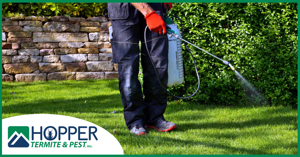
What is IPM?
If you have spent any amount of time talking to people in the pest control industry over the past few years, you’ve probably heard about IPM. But what is IPM, exactly? And what advantages does it present to the average homeowner over traditional pest control and treatment methods?
IPM stands for Integrated Pest Management. In short, it is a green pest control option that focuses as much on keeping pests away and preventing further problems as it does on eliminating current infestations. Historically, extermination kills off any pests that are currently on your property but does little to address the larger environmental concerns that may have drawn those pests to your property in the first place. The ultimate goal of IPM is long-term pest prevention. This is done through a combination of biological control, habitat manipulation, adjustment of cultural practices, as well as the strategic placement of pest-resistant plant varieties and (occasionally) the safe application of pesticides and traps.
At Hopper Termite & Pest, we are proud to incorporate elements of IPM into our green pest control options. Keep reading to learn more about our seven step IPM process, and do not hesitate to call us for all your residential and commercial pest control needs.
Our 7 Step Approach to Integrated Pest Management
- Inspection: Thoroughly inspecting your property is the first step to figuring out where you may be vulnerable to infestations, and subsequently stopping more pests from getting in.
- Sanitation: After we have completed our inspection, we may recommend certain sanitation improvements to reduce environments that pests may be drawn to. For instance, it is a good idea to eliminate standing water wherever possible, and if you are leaving food out in an improper way, we may suggest better practices for storage.
- Exclusion: Exclusion is a kind of pest control technique that has taken off in popularity in recent years. While it is not strictly tied to Integrated Pest Management, it is often an important part of the larger service. Basically, exclusion just refers to sealing up cracks and holes throughout your property, and eliminating as many areas as possible where pests can easily enter your home.
- Trapping: Mechanical controls may not always be a part of our IPM approach, it just depends on the severity of your problem. However, in cases, where there is an active threat of pests or wildlife continuing to invade your property, we may use barriers and traps, such as glue boards, to stop ongoing activity. In extreme cases, pesticides may also be necessary.
- Landscaping: While Hopper Termite & Pest will never come in and try to redo your whole yard just for the heck of it, we may suggest some potential upgrades to discourage pests from taking up residence in or around your home. For example, if you have shrubbery that pushes right up against your home, or tree limbs that hang over your house, we may suggest trimming these down, as one of the most popular ways for pests to enter residences and other buildings is via plants and vegetation.
- Biological Control: When Hopper Termite & Pest talks about biological control, we’re talking about using other biological methods to fight pests that may be a problem for your property. For instance, while the last step revolved around trimming vegetation, biological control may actually involve putting certain plants in your garden or yard to keep pests away. In other cases, we may even use aphids and pheromones to reduce the presence of pests.
- Education: The final step of IPM is education—basically, finding ways that we can give back to you. Our pest control technicians want you to be as informed as possible, so once our job is done, we will suggest ways you can mitigate factors and keep pests away for the foreseeable future. Remember, our goal, and the goal of IPM, is long-lasting results, so we will do everything we can to help you live a comfortable, pest-free life.
To schedule IPM or another pest control service today, dial (870)425-4122, or contact us online. You can also click here to sign up for a service plan, guaranteeing you comprehensive pest protection from season to season.
